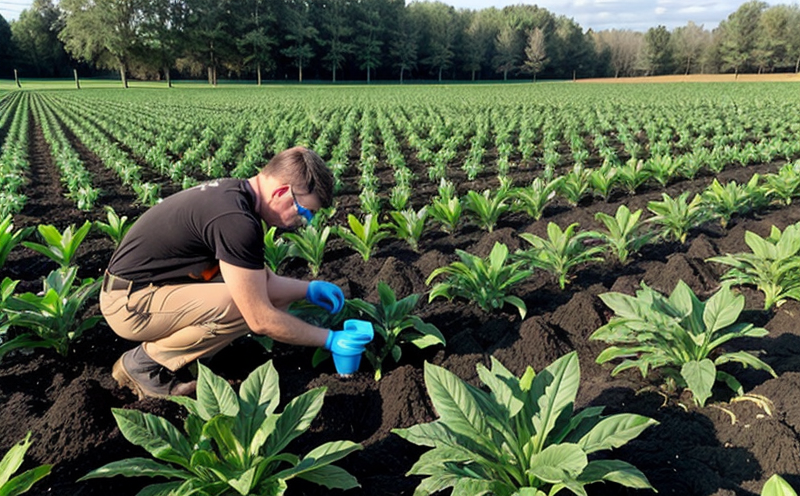Fertilizer Toxicity Testing (Plant Safety)
When it comes to ensuring crop health and yield, the quality of fertilizers is paramount. Fertilizer toxicity testing assesses whether a fertilizer contains compounds that could potentially harm plants at high concentrations or under certain conditions. This critical test ensures that agricultural products are safe for both the environment and human consumption.
The process involves several steps to ensure accurate and reliable results. First, the fertilizer sample is thoroughly prepared according to ASTM D6582-17 guidelines. Once prepared, a controlled amount of the fertilizer solution is applied to plant specimens in a laboratory setting. The growth parameters are then monitored over time under standardized conditions.
The testing process also involves assessing various toxic elements commonly found in fertilizers such as heavy metals like lead (Pb), cadmium (Cd), and arsenic (As). These elements can accumulate in soil and plants, leading to reduced crop quality and potential health risks. Compliance with international standards such as ISO 17025 ensures that the laboratory adheres to strict quality control measures.
The results of this test are crucial for various stakeholders including farmers, agricultural companies, and regulatory bodies. Farmers can use these insights to select fertilizers that do not pose a risk to their crops or soil health. Agricultural firms benefit from ensuring compliance with local and international regulations, thereby protecting brand reputation. Regulatory agencies gain valuable data points to enforce standards and policies.
Understanding the toxicity levels of fertilizers is essential for sustainable agricultural practices. By conducting thorough toxicity testing, we contribute to a safer food supply chain and promote environmental stewardship. This service not only meets regulatory requirements but also supports innovation in plant nutrition science.
Benefits
Fertilizer toxicity testing offers numerous advantages that are crucial for maintaining the integrity of agricultural practices:
- Enhanced Crop Quality: Ensures that crops grown with fertilizers do not suffer from harmful effects, leading to better quality produce.
- Regulatory Compliance: Meets stringent international and local standards ensuring safe products for consumers.
- Eco-Friendly Practices: Supports sustainable farming by minimizing the risk of soil contamination and runoff into water bodies.
- Innovation Support: Provides data that can be used to develop safer and more effective fertilizers.
The long-term benefits extend beyond immediate agricultural practices. By ensuring plant safety, this testing contributes significantly to public health and environmental sustainability.
Why Choose This Test
- Precision Measurement: Utilizes advanced analytical techniques that ensure precise measurement of toxic elements in fertilizers.
- Comprehensive Analysis: Covers a wide range of potentially harmful compounds, providing a holistic view of the fertilizer's safety profile.
- Standardized Procedures: Adheres to internationally recognized standards ensuring consistent and reliable results.
- Expertise in Agriculture: Leveraging our team's deep expertise in agricultural science and plant nutrition.
The combination of these factors makes fertilizer toxicity testing an indispensable tool for maintaining the health of both plants and people. This service not only meets regulatory requirements but also supports sustainable agriculture practices that benefit all stakeholders involved.
Competitive Advantage and Market Impact
Fertilizer toxicity testing plays a vital role in enhancing market competitiveness by ensuring product safety and compliance with stringent regulations. By conducting this test, agricultural companies can:
- Gain Consumer Trust: Demonstrate commitment to producing safe products that meet or exceed international standards.
- Increase Market Share: Differentiate their offerings from competitors by showcasing a superior safety profile for their fertilizers.
- Avoid Legal Penalties: Stay ahead of regulatory changes and avoid potential legal issues associated with non-compliance.
The results of this testing can be leveraged in various ways to impact the market positively. For instance, companies can use these data points to enhance their marketing strategies or even develop new products that are explicitly designed for safer plant nutrition. This not only strengthens brand reputation but also contributes to broader industry standards.





